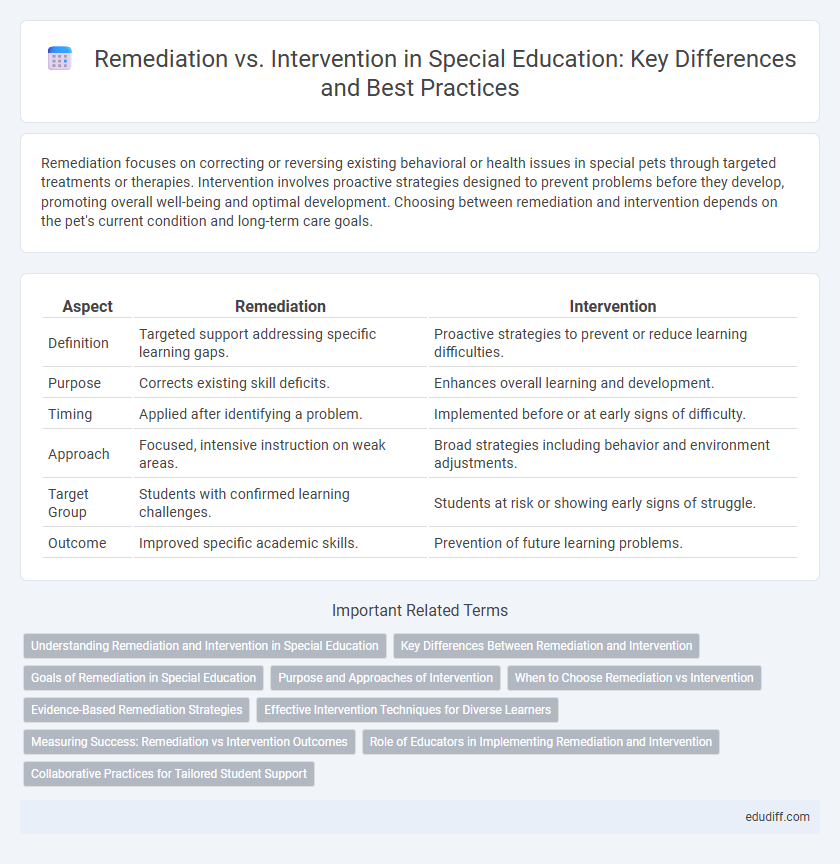Remediation focuses on correcting or reversing existing behavioral or health issues in special pets through targeted treatments or therapies. Intervention involves proactive strategies designed to prevent problems before they develop, promoting overall well-being and optimal development. Choosing between remediation and intervention depends on the pet's current condition and long-term care goals.
Table of Comparison
| Aspect | Remediation | Intervention |
|---|---|---|
| Definition | Targeted support addressing specific learning gaps. | Proactive strategies to prevent or reduce learning difficulties. |
| Purpose | Corrects existing skill deficits. | Enhances overall learning and development. |
| Timing | Applied after identifying a problem. | Implemented before or at early signs of difficulty. |
| Approach | Focused, intensive instruction on weak areas. | Broad strategies including behavior and environment adjustments. |
| Target Group | Students with confirmed learning challenges. | Students at risk or showing early signs of struggle. |
| Outcome | Improved specific academic skills. | Prevention of future learning problems. |
Understanding Remediation and Intervention in Special Education
Remediation in special education targets specific skill deficits through tailored instruction designed to help students regain foundational abilities in areas such as reading, writing, or math. Intervention refers to systematic support measures implemented early to address learning challenges and prevent further academic difficulties, often using evidence-based strategies and frequent progress monitoring. Understanding the distinctions and applications of remediation and intervention ensures educators can provide appropriate, individualized support that addresses both immediate skill gaps and ongoing developmental needs.
Key Differences Between Remediation and Intervention
Remediation focuses on addressing specific deficits in learning by revisiting and reteaching foundational skills, while intervention targets preventing or reducing academic or behavioral challenges through proactive support. Remediation is typically reactive, occurring after a student has demonstrated significant skill gaps, whereas intervention is often proactive and ongoing to support progress and prevent failure. Key differences include timing, purpose, and instructional strategies, with remediation emphasizing skill recovery and intervention emphasizing early assistance.
Goals of Remediation in Special Education
The primary goals of remediation in special education are to identify and address specific learning deficits through targeted instruction tailored to each student's unique needs. This process aims to build foundational skills, improve academic performance, and promote independence in learning by using evidence-based strategies and continuous assessment. Effective remediation fosters skill mastery that enables students to access the general curriculum and participate fully in educational activities.
Purpose and Approaches of Intervention
Intervention in special education aims to provide targeted support tailored to individual student needs, focusing on skill development and behavior modification through evidence-based strategies. Unlike remediation, which addresses deficits by reteaching content, intervention employs proactive, multi-tiered approaches such as Response to Intervention (RTI) to prevent learning difficulties. These approaches integrate continuous progress monitoring and collaboration among educators, specialists, and families to optimize educational outcomes.
When to Choose Remediation vs Intervention
Choose remediation when addressing foundational skill gaps that hinder overall learning progress, as it targets specific deficits through structured practice and reinforcement. Opt for intervention when early signs of learning difficulties emerge, requiring immediate, targeted support to prevent further academic decline. Effective educational planning involves assessing student performance data to determine whether a comprehensive skill rebuild (remediation) or a focused, time-sensitive strategy (intervention) is most appropriate.
Evidence-Based Remediation Strategies
Evidence-based remediation strategies emphasize targeted support tailored to individual learning gaps, ensuring measurable progress in students with special needs. These strategies rely on empirical research and data-driven approaches to enhance skill acquisition and retention. Implementing systematic, structured interventions improves academic outcomes more effectively than generic remediation methods.
Effective Intervention Techniques for Diverse Learners
Effective intervention techniques for diverse learners incorporate individualized assessment data to tailor strategies that address specific learning needs and strengths. Multi-sensory approaches, culturally responsive teaching, and explicit skill instruction enhance engagement and skill acquisition for students with varied linguistic, cognitive, and socio-emotional profiles. Progress monitoring and collaborative input from educators, specialists, and families ensure interventions remain dynamic and impactful, optimizing educational outcomes across diverse learning populations.
Measuring Success: Remediation vs Intervention Outcomes
Measuring success in remediation versus intervention involves evaluating specific outcome metrics such as skill acquisition, behavioral improvements, and academic performance gains. Remediation outcomes often focus on closing foundational skill gaps through targeted support, while intervention success emphasizes proactive strategies to prevent or minimize learning challenges. Data-driven assessments and progress monitoring tools provide critical insights to compare the effectiveness of each approach in special education settings.
Role of Educators in Implementing Remediation and Intervention
Educators play a critical role in implementing remediation and intervention by identifying students' learning gaps and tailoring instruction to meet individual needs. Effective remediation focuses on revisiting foundational skills, while intervention targets specific deficits with evidence-based strategies to promote academic progress. Ongoing assessment and collaboration among teachers, specialists, and families ensure timely support and measurable improvements in student outcomes.
Collaborative Practices for Tailored Student Support
Remediation and intervention in special education emphasize collaborative practices that integrate insights from educators, specialists, and families to design tailored student support plans. Effective collaboration ensures targeted strategies address individual learning gaps and behavioral challenges, promoting inclusive growth. Data-driven decision-making and ongoing communication empower teams to adapt interventions, maximizing student progress and engagement.
Remediation vs Intervention Infographic

 edudiff.com
edudiff.com